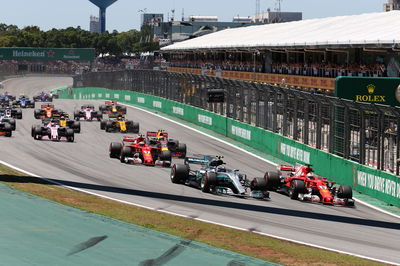Abiteboul unsure FIA can fully enforce F1 oil burn regulation in qualifying
Renault boss Cyril Abiteboul has cast doubts over whether the FIA will be able to successfully clamp down on Formula 1 teams burning oil during qualifying in 2018.
Strict regulations have been introduced for the upcoming 2018 season, after the issue of teams burning oil to aid consumption and help boost power became a talking point last year, with the FIA moving to try and curb the issue by imposing tighter rules ahead of the 2017 Italian Grand Prix.

Renault boss Cyril Abiteboul has cast doubts over whether the FIA will be able to successfully clamp down on Formula 1 teams burning oil during qualifying in 2018.
Strict regulations have been introduced for the upcoming 2018 season, after the issue of teams burning oil to aid consumption and help boost power became a talking point last year, with the FIA moving to try and curb the issue by imposing tighter rules ahead of the 2017 Italian Grand Prix.
The FIA issued a technical directive last week in an attempt to enforce parity between the engines used by factory teams and those supplied to its customers, including a new 0.6-litre per 100km oil usage limit, a restriction on different oil specifications and a ban on active control valves in parts of the engine.
In response to the move, Red Bull chief Christian Horner called on the FIA to do more to close loopholes that are being exploited with burning oil in qualifying, but Abiteboul is unsure whether such regulations can be imposed.
“I'm confident that there is a clear regulation. I'm not fully confident yet about the capacity of the FIA to enforce the regulation,” Abiteboul said. “That’s why we're working in partnership with the FIA to make sure that they have this ability.
“I really believe that lots has been done in relation to this opportunity or loophole in the regulations. I think we now have a clear regulation. We continue to work with the FIA to make sure that they have the equipment to monitor on a permanent basis the oil.
“There is a lubricant in any engine in the world, and there will continue to be so, but in quantities that are relative to the purpose of the oil which is to lubricate, not to do anything else.
“We're making sure that it's not just about having a regulation but about having a capacity to enforce and to monitor that we are making proper use of the regulations.”
Abiteboul insisted Renault has stuck to a philosophy of treating its customer teams equally throughout its tenure in F1, though he feels discrepancies in the sport will be hard to police.
“I know it's a constant concern from customer teams and for very good reason to make sure they are treated equally because that certainly should be the case. It certainly has been the way that we have been acting towards our customers in our 40 years of history of being an engine supplier in Formula 1.
“That was always our intent, that has always been in the regulations. Now there is a clear directive in relation to that. But we also have to accept that there will always be some small differences.
“Just to give you one example, and I don't want to create a debate situation to that, for example Red Bull Racing is using a different petroleum partner. They will be using a different type of fuel and lube.
“That's creating some small discrepancies, but they know that and they've done their decision. We have not forced them into adopting a different partner. Our partner was available to them, but they prefer to use a different partner.”












